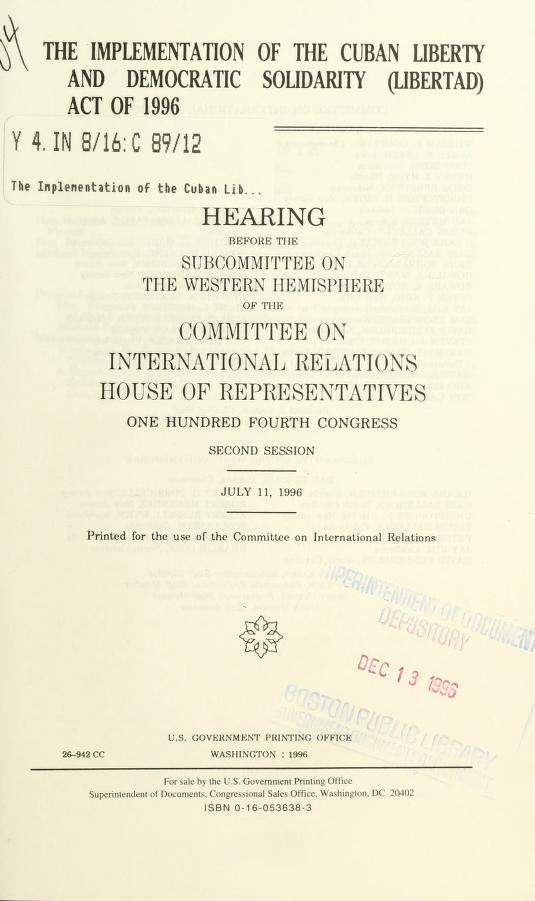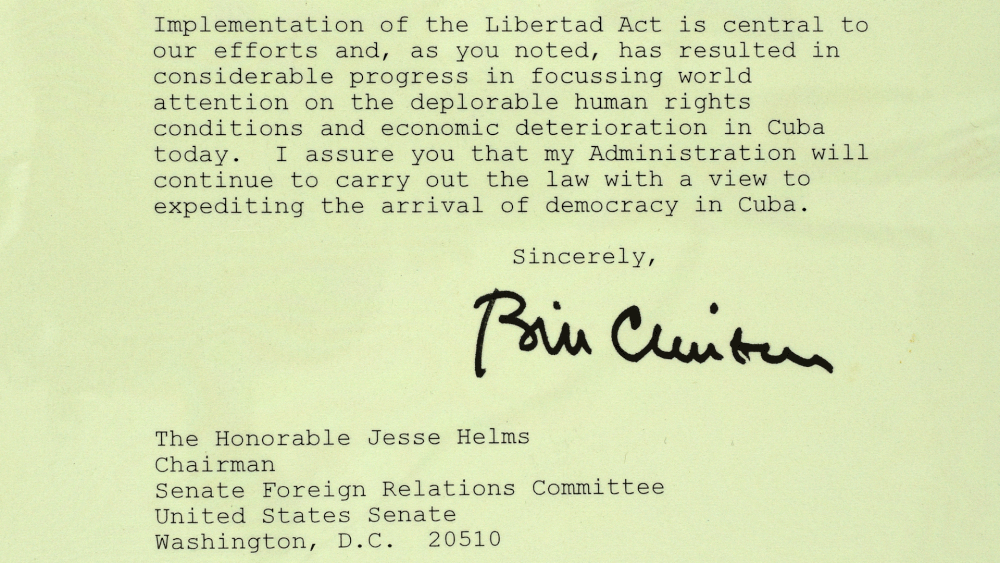White House Expected Today To Decide Upon Implementation Of Title III Of Helms-Burton
/Decision Today For Of Title III Of The Libertad Act Of 1996
The Trump Administration is to report whether to continue a suspension of Title III of the Cuban Liberty and Democratic Solidarity Act of 1996 (“Libertad” or “Helms-Burton”). Codified in Title 22, Sections 6021-6091 of the U.S. Code. P.L. 104-114.
The most important question for the Trump Administration- Is a policy decision crafted to resolve an issue or maintain an issue; create disruption or bring about a resolution? When mediation is an option, should blunt force trauma be the preferred method of engagement?
An outline [LINK] for mediation to compensate the 5,913 certified claimants has been presented to the Trump Administration.
Perhaps, the Trump Administration may issue a sharply-worded conditional signing statement in conjunction with a further six-month suspension of Title III. Or, partially or fully permit the implementation of Title III.
The Libertad Act is known widely as “Helms-Burton” for its authors: The Honorable Jesse Helms (R- North Carolina) of the United States Senate and The Honorable Dan Burton (R- Indiana) of the United States House of Representatives. Senator Helms retired in 2003 and died in 2008 and Representative Burton retired in 2013.
Title III authorizes individuals subject to United States jurisdiction as of 13 March 1996 to file lawsuits in United States District Courts against individuals and companies that are using (“trafficking”) in property located in the Republic of Cuba which was expropriated without compensation by the government of the Republic of Cuba. Unique to the statute is the lawsuits may not be dismissed.
For purposes of legal trajectory, a lawsuit could be filed in a United States District Court (likely primarily in Miami, Florida and Newark, New Jersey where the majority of individuals of Cuban descent reside). If a lawsuit is lost, the appeal would be to the United States Circuit Court of Appeals. If that appeal is lost, the next venue would be in the United States Supreme Court.
Every six months, the Libertad Act requires the President to either suspend the implementation of Title III or permit the implementation of Title III. Since the inception of the Libertad Act, every President has suspended the implementation of Title III, including The Honorable Donald Trump, President of the United States, on three occasions (2017, 2018, and 2018). The current suspension expires on 31 January 2019.
The President, or his designee (the United States Secretary of State since 2013), must notify relevant committees of the United States Congress fifteen (15) days prior to a decision to suspend or implement. Those committees are the United States House Committee on Foreign Affairs, United States House Committee on Appropriations, United States Senate Committee on Foreign Relations, United States Senate Committee on Appropriations.
From the text of the statute: "(2) Additional suspensions.--The President may suspend the effective date under subsection (a) for additional periods of not more than 6 months each, each of which shall begin on the day after the last day of the period during which a suspension is in effect under this subsection, if the President determines and reports in writing to the appropriate congressional committees at least 15 days before the date on which the additional suspension is to begin that the suspension is necessary to the national interests of the United States and will expedite a transition to democracy in Cuba."
The Certified Claims
There are 8,821 claims of which 5,913 awards were certified by the United States Foreign Claims Settlement Commission (USFCSC- https://www.justice.gov/fcsc) at the United States Department of Justice which are valued at US$1,902,202,284.95.
The first asset to be expropriated by the government of the Republic of Cuba was an oil refinery in 1960 owned by White Plains, New York-based Texaco, Inc., now a subsidiary of San Ramon, California-based Chevron Corporation (USFCSC: CU-1331/CU-1332/CU-1333 valued at US$56,196,422.73).
The largest certified claim (Cuban Electric Company) valued at US$267,568,413.62 is controlled by Boca Raton, Florida-based Office Depot, Inc. The second-largest certified claim (International Telephone and Telegraph Co, ITT as Trustee, Starwood Hotels & Resorts Worldwide, Inc.) valued at US$181,808,794.14 is controlled by Bethesda, Maryland-based Marriott International. The smallest certified claim is by Sara W. Fishman in the amount of US$1.00 with reference to the Cuban-Venezuelan Oil Voting Trust.
The two (2) largest certified claims total US$449,377,207.76, representing 24% of the total value of the certified claims. Thirty (30) certified claimants hold 56% of the total value of the certified claims. This concentration of value creates an efficient pathway towards a settlement.
The USFCSC permitted interest to be accrued in the amount of 6% per annum; with the current value approximately US$9 billion.
“The Foreign Claims Settlement Commission of the United States (FCSC) is a quasi-judicial, independent agency within the Department of Justice which adjudicates claims of U.S. nationals against foreign governments, under specific jurisdiction conferred by Congress, pursuant to international claims settlement agreements, or at the request of the Secretary of State. Funds for payment of the Commission's awards are derived from congressional appropriations, international claims settlements, or liquidation of foreign assets in the United States by the Departments of Justice and the Treasury.”
Certified claimants with current or recent activity within the Republic of Cuba include: New York, New York-based Colgate-Palmolive, Moline, Illinois-based Deere & Company, Atlanta, Georgia-based Delta Air Lines, Boston, Massachusetts-based General Electric, Bethesda, Maryland-based Marriott International, Chicago, Illinois-based University of Chicago, Denver, Colorado-based Western Union and New Haven, Connecticut-based Yale University among others.
The Obama Administration deemed a resolution of the certified claims as a “top priority,” but had only three (3) discussions (not negotiations) with representatives of the government of the Republic of Cuba in 2,923 days (766 days if calculated from 17 December 2014); this was woefully inadequate. President Trump can correct this failure of leadership.
Options
Continuing suspension of Title III will preserve for President Trump his ability to negotiate a settlement on behalf of the 5,913 certified claimants- United States citizens and United States companies. Any effort to constrain the President from directly or indirectly guiding his negotiating team erodes the unique powers of the Executive Branch to conduct foreign policy. And, negotiating a settlement based upon US$1.9 billion or US$8 billion is far less complicated than attempting to bridge restitution for what could approach US$100 billion or more by those who do not have certified claims if Title III is enabled.
If Title III is not suspended (or partially suspended) there would not only be a disruption to the ability of President Trump to negotiate a settlement on behalf of the certified claimants during his first term, but the disruption would extend through his second term and through the terms of his successors. The reason would be potentially hundreds of thousands of claims that would become eligible to be heard by United States Federal Courts. Most impactful, is Title III prohibits the dismissal of claims proceedings in United States Federal Courts once they are filed. As most of the proceedings would be filed in the State of Florida, the impact upon the judicial process would be substantial, crippling; and would result in more non-related significant cases being delayed from adjudication.
Implementation of Title III would prohibit President Trump from engaging his DNA- to negotiate a deal. And, this prohibition would not solely be for the remaining 735 days of President Trump’s first term, nor the 1,460 days of this second term… it would likely be in perpetuity as the current and future government of the Republic of Cuba would never have the financial capacity to absorb the judgements issued by United States Federal Courts- even if they were inclined to do so.
Unlike his predecessors, President Trump should issue a sharply-worded conditional signing statement in conjunction with a further six-month suspension of Title III.
The signing statement should create a six-month “window of opportunity” within which The White House staff would engage directly with representatives of the thirty (30) certified claimants with the largest values of assets expropriated without compensation. A third-party United States-based negotiator would be retained to represent the interests of the certified claimants to the government of the Republic of Cuba.
LINK To PDF
Blog Post Links:
https://www.cubatrade.org/blog/2018/11/18/lojx6s6oe5epgonh6mub855d5ak143
http://www.cubatrade.org/blog/2017/1/12/h2uudthnn6be8hfgxifqsrdo4aqpb0?rq=claims



